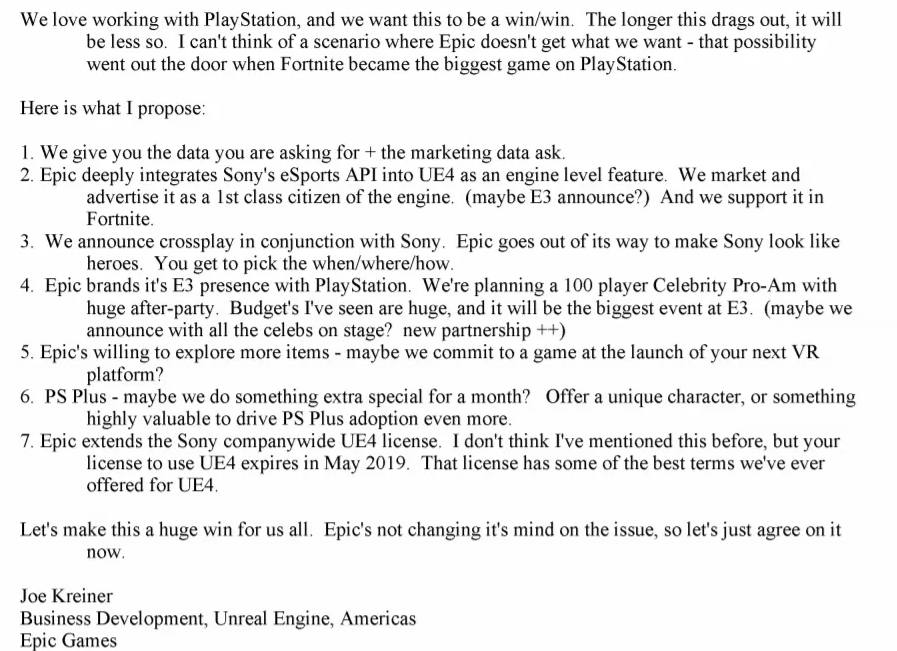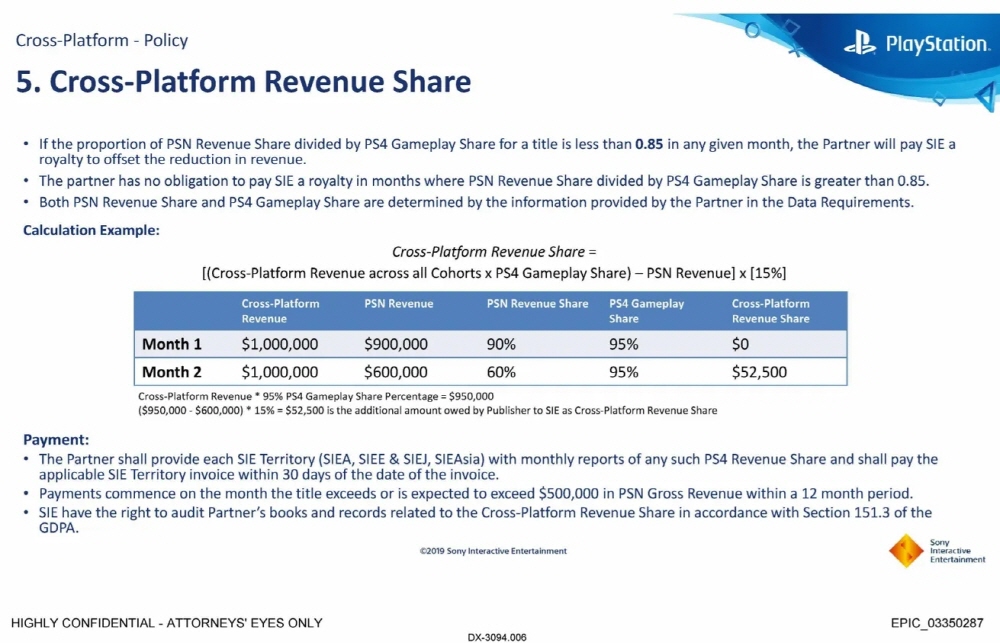Apple and Epic Games have resumed lawsuits over a 30% fee on the App Store. However, it turned out that in court, Sony demanded money from Epic Games as a condition for enabling Fortnite cross-play for the PlayStation 4.
It is widely known that Sony was opposed to cross play. At the time, Sony actually rejected Xbox, Switch and Crossplay by saying that it is better to make decisions based on the best user experience. However, after the announcement of the policy change in September 2018, it is now possible to cooperate or compete with other console players.

In the lawsuit, Epic Games CEO Tim Sweeney reported that Joe Kreine, vice president of Epic’s business development, sent a letter to Sony. Here, it turns out that Epic Games was desperately wanting the cross-play ban. Epic also appealed that this effort would be a big win for all of us, such as suggesting to make Sony stand out and adding characters for PS Plus subscribers to jointly announce cross play with Sony at E3, the world’s largest game exhibition. did.
Sony disagrees, and at the time, the senior director of development (Gio Corsi) denied this advantage, saying that cross-play does not have a slam dunk, regardless of size, and, as you know, many companies are seeking similar ideas, but cross-play is the PlayStation. He maintained the position that there was no company that could be explained as improving the business.
However, a new reverse proposal by Sony is also being submitted. After cross-play became available in August 2019, a document titled Cross-Platform Policies, Requirements and Processes indicates that additional royalties are paid if the amount incurred by PlayStation for cross-play game online revenue is less than 85% You can attach conditions.

This cross-platform revenue sharing is intended to offset the decline in revenue from Sony’s enabling cross-play. Another platform stipulates that virtual currency cannot be exchanged on the Playstation and must be released.
CEO Tim Sweeney confirms in court testimony that Sony is the only platform that demands such cross-play compensation. It also made it clear that Epic would have to agree to pay an additional fee to Sony to enable Fortnite cross-play.
It is not clear when this revenue sharing system was last implemented, but it remains true that virtual currencies cannot be shared across other platforms. This lawsuit, which summoned Sony, who has no direct relationship in the fight between Apple and Epic, could increase the number of points to watch in the future. Related information can be found here.
Meanwhile, in the relationship between Apple and Epic Games, Epic Games deleted Fortnite from the App Store, claiming that it violated the rules in in-app purchases, and eventually developed into a court battle. It turned out that it was also being reviewed.
Epic Games is currently offering the Fortnite Crew, a subscription model, such as limited costumes for Fortnite virtual currency. However, it turned out that the trial submission data was planning a service that bundled Apple Music or Apple TV+ when it was still in the planning stage under the tentative name Fortnite Club.
The contract plan offered two Fortnite Club and Apple services for $20 per month, and was set to cut prices by about $6 compared to a separate purchase. The document also lists the shares of both sides. In the case of a contract with the App Store app, Apple takes $15 and Epic Games $5.
It is not known how far the negotiations between Apple and Epic Games have progressed, but as Apple TV+ is in writing, it can be viewed after March 2019. However, it can be seen that since then, the relationship between Apple and Epic Games has deteriorated, and the bundle has not seen the light.
The contract-related matters suggest that Apple-branded content was considering including Fortnite. Epic Games even released a video of the Apple dictator dominating the world, but if there were no competition between the two companies, Fortnite might have had the iPhone 12 and M1 Mac costumes inscribed.
In addition, as the lawsuit for Apple and Epic Games resumed, various confidential data were being submitted to the court as evidence. Among them, it was revealed that an Apple executive was amazed over the invitational iPad app between Apple and Facebook in an email.
In August of last year, Facebook criticized Apple for forcing the deletion of games in the iOS version of the Facebook Gaming app in its App Store policy. This confrontation between the two companies dates back to a long time ago. Reportedly, in 2011, three former Apple executives, including Steve Jobs, found emails sent and received in trial data. Accordingly, it is reported that there is a high possibility that there was a similar conflict between Apple and Facebook as one of the reasons for the delay in delivery of the Facebook app for iPad 10 years ago.
The first iPad was released in 2010, but the Facebook app for iPad was released in October 2011. In the meantime, a Facebook engineer posted on a blog that the release of the app was delayed due to the awkward relationship with App and left.
The email in question was sent by an Apple software representative to the marketing manager and Steve Jobs. The bottom line is that Apple did not allow the Facebook iPad app to include built-in apps. Embedded apps are browser games that run on Facebook, such as FarmVille, which was a hit as an early social game.
In the email, Mark Zuckerberg said he was frustrated because he saw embedded apps as part of Facebook’s overall experience. Farmville was making a lot of money from in-game billing, so it’s natural that Zuckerberg doesn’t like to get rid of it. Therefore, Zuckerberg demands compromise from Apple, does not include the app directory and does not attach links in the Facebook app, does not run third-party applications in the built-in web, that is, the Facebook in-app browser, and allows user posts in app-related news feeds. When you click the app link, it switches to the installed native app, or if it is not installed, it moves to the app store or connects to Safari.
Steve Jobs, who was the CEO at the time, replied that he agreed using the iPad and thought it was reasonable except for the third proposal from Facebook. But here, I wrote the Facebook spelling as’fecebook’, not’facebook’. fece is also a fece typo, meaning feces.
Apple Vice President Phil Schiller also doesn’t know why he wants to include an internal application, so the app cannot be reviewed by us without any non-native relationship with Apple, a license, cannot use Apple APIs and tools, or use its store He refused to say no.
When the Facebook iPad app was delivered, built-in apps like Farmville may not support their own in-game currency, which can be seen as a concession to Apple. Since then, there have been various reports that the relationship between Apple and Facebook has deteriorated rather than improved. There have been rumors that Facebook, fearing that it will reduce revenue through iOS 14.5 app tracking transparency, has campaigned against it and is preparing an antitrust lawsuit against Apple.
Facebook is appealing to allow user tracking if you want to use its apps for free, and it can be said that there is no countermeasure to the impact of Apple’s privacy revenue stream on targeted advertising. Interest is also focused on how the relationship between the two companies will be in the future. Related information can be found here.


















Add comment